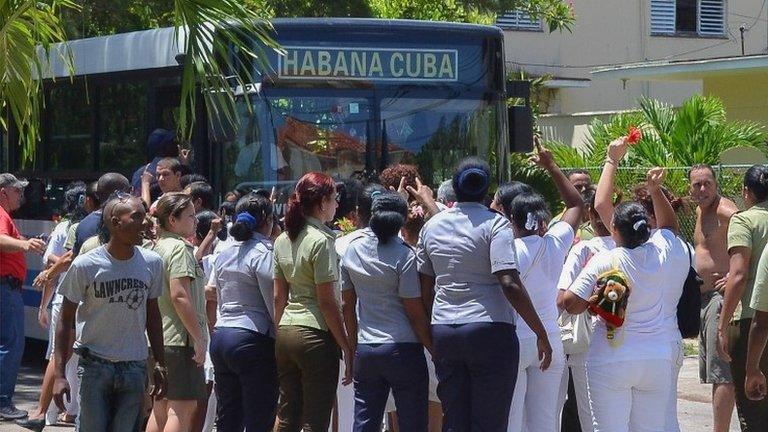Fidel Castro death: Cuban dissidents call off weekly march
- Published
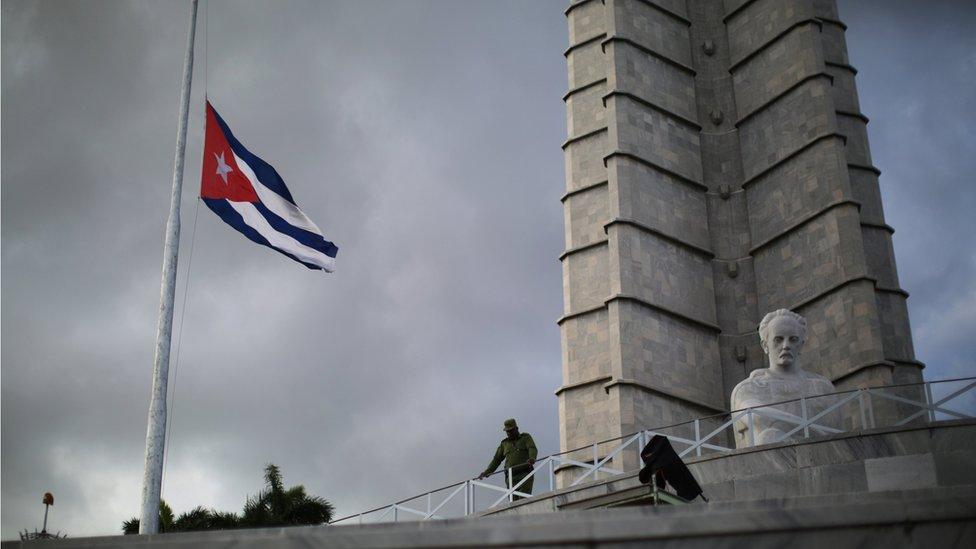
Havana's Revolution Square will host a ceremony to remember Castro
Cuba's most prominent dissident group has called off its traditional protest for the first time in 13 years following the death of the country's revolutionary leader Fidel Castro.
The Ladies in White say the decision is to avoid tensions.
The group, founded by wives of jailed dissidents, has long defied a protest ban in Cuba with a weekly march.
Castro died on Friday at the age of 90. Flags are flying at half mast as the country observes nine days of mourning.
From Monday, people will be able to pay their respects at memorials and rallies before Castro's ashes are taken to Santiago de Cuba where he launched his bid for power.
And a mass public ceremony is planned at Havana's Revolutionary Square on Tuesday.
But there have been further celebrations in the US city of Miami where many anti-Castro Cuban exiles and their families have settled.
The cause of death has not yet been revealed but Castro had been in poor health since he nearly died of an intestinal illness in 2006.
Sadness on the streets of Havana: "For us he is an idol"
The mood in the capital remains subdued, the BBC's Barbara Plett-Usher in Havana says, with people still absorbing the news.
Castro came to power in 1959 and ushered in a Communist revolution.
Supporters say he returned Cuba to the people, and praise him for some of his social programs, such as public health and education.
But critics call him a dictator, who led a government that did not tolerate opposition and dissent, accused of numerous alleged human rights abuses.
Little Havana, a neighbourhood in Miami, celebrates Fidel Castro's death
The regular Sunday march of the Ladies in White is a rare expression of dissent largely tolerated by the government.
But police have clamped down in recent months, our correspondent in Havana adds.
The women march in silence through the streets of Havana following Mass at a Roman Catholic Church, asking for the release of political prisoners and for human rights to be respected.
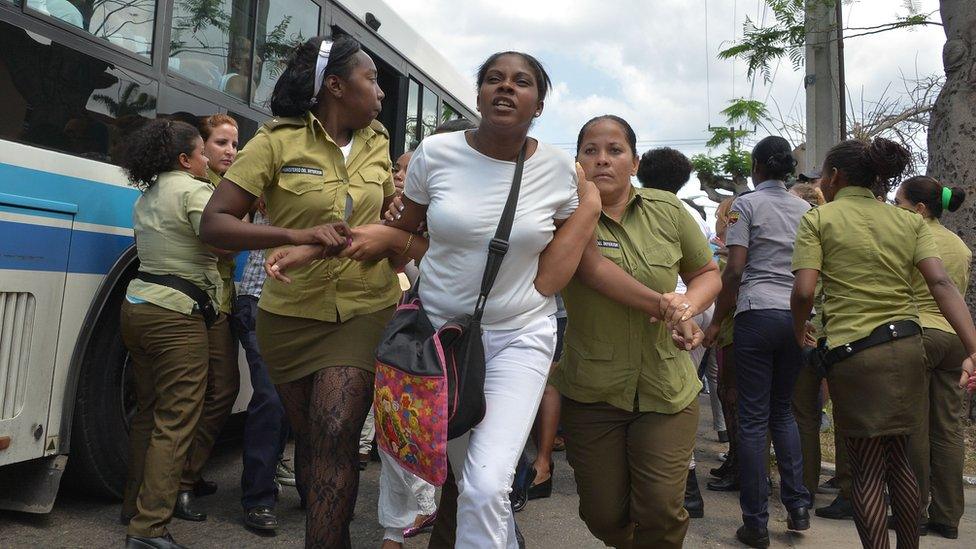
The demonstrations by the Ladies in White are frequently broken up by police
"We're not going to march today [Sunday] so that the government does not take it as a provocation and so that they can pay their tributes," the group's leader, Berta Soler, said.
"We respect the mourning of others and will not celebrate the death of any human being."
In a tweet reacting, external to the former leader's death, the group said: "Fidel Castro has died, may God forgive him, I WON'T"
Cuban authorities say the Ladies in White are in the pay of the United States and form part of Washington's "decades-old effort to undermine Cuba's socialist revolution".
The government says there are no political prisoners in the country.

How Castro defied the US
Throughout the Cold War, Fidel Castro was a thorn in Washington's side.
An accomplished tactician on the battlefield, he and his small army of guerrillas overthrew the military leader Fulgencio Batista in 1959 to widespread popular support.
Within two years of taking power, he declared the revolution to be Marxist-Leninist in nature and allied Cuba firmly to the Soviet Union - a move that led to the missile crisis in 1962, bringing the world to the brink of nuclear war before the Soviet Union abandoned its plan to put missiles on Cuban soil.
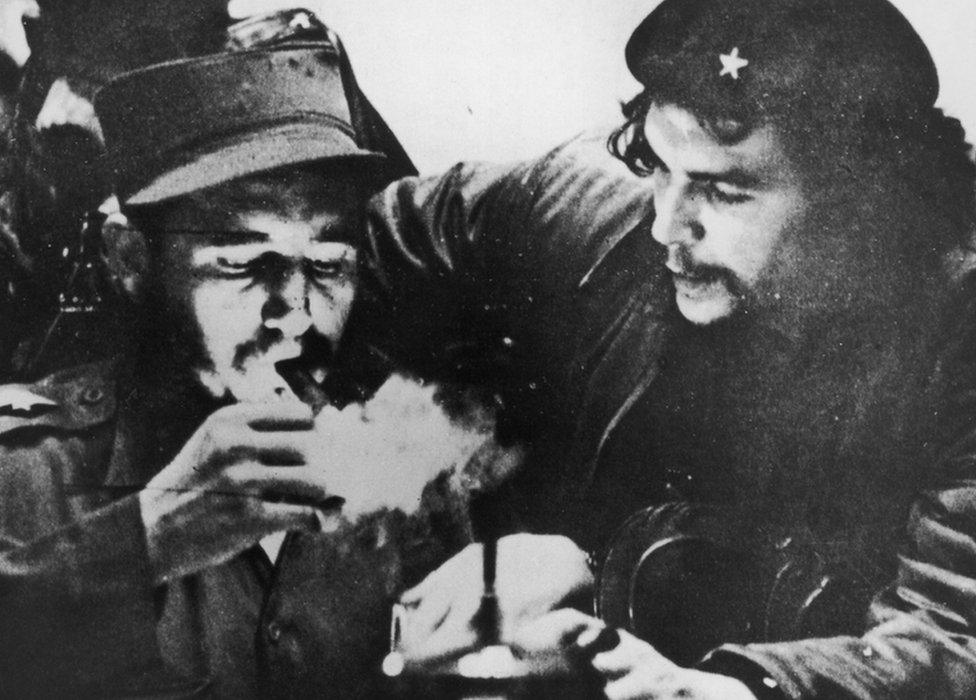
Castro in the mid-1950s with another leading revolutionary - Che Guevara
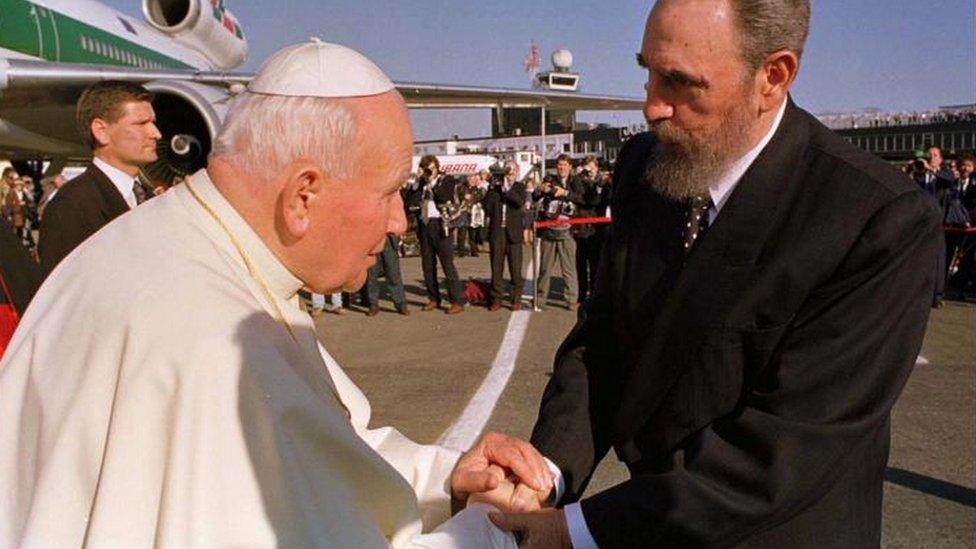
Years later he would meet Pope John Paul II, despite declaring Cuba an atheist state
Despite the constant threat of a US invasion as well as the long-standing economic embargo on the island, Castro managed to maintain a communist revolution in a nation just 90 miles (145km) off the coast of Florida.
Despised by his critics as much as he was revered by his followers, he maintained his rule through 10 US presidents and survived scores of attempts on his life by the CIA.
He established a one-party state, with hundreds of supporters of the Batista government executed. Political opponents have been imprisoned, the independent media suppressed. Thousands of Cubans have fled into exile.

How has the world reacted?
Many world leaders have paid tribute to Castro. Russian President Vladimir Putin described him as a "reliable and sincere friend" of Russia, while Chinese President Xi Jinping said his people had "lost a good and true comrade".
The Soviet Union's last leader, Mikhail Gorbachev, said: "Fidel stood up and strengthened his country during the harshest American blockade, when there was colossal pressure on him."
However, US President-elect Donald Trump said Castro had been a "brutal dictator".
Canadian Prime Minister Justin Trudeau came under fire on social media and from political opponents for describing Castro as a "remarkable leader",, external who despite being a "controversial figure" made significant improvements to the education and healthcare of Cubans.
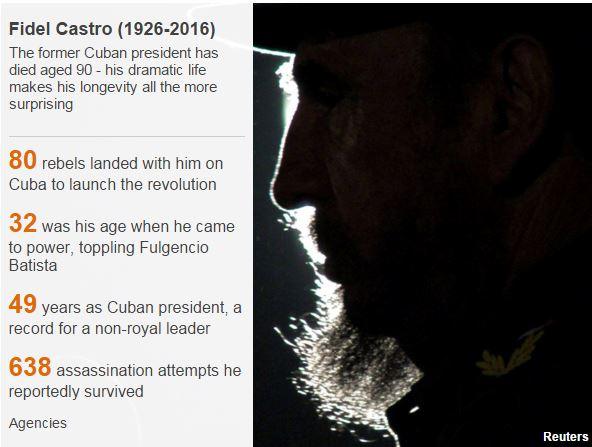
UN Secretary General Ban Ki-moon acknowledged advances in education, literary and health under Castro, but said he hoped Cuba would "continue to advance on a path of reform, greater prosperity and human rights".
Pope Francis, who met Castro, an atheist, when he visited Cuba in 2015, called his death "sad news".
In Venezuela, Cuba's main regional ally, President Nicolas Maduro said "revolutionaries of the world must follow his legacy".

Fidel Castro's key dates
Fidel Castro made a rare appearance at Cuba's Communist Party congress
1926: Born in the south-eastern Oriente Province of Cuba
1953: Imprisoned after leading an unsuccessful rising against Batista's regime
1955: Released from prison under an amnesty deal
1956: With Che Guevara, begins a guerrilla war against the government
1959: Defeats Batista, sworn in as prime minister of Cuba
1961: Fights off CIA-sponsored Bay of Pigs invasion by Cuban exiles
1962: Sparks Cuban missile crisis by agreeing that USSR can deploy nuclear missiles in Cuba
1976: Elected president by Cuba's National Assembly
1992: Reaches an agreement with US over Cuban refugees
2006: Hands over reins to brother Raul due to health issues, stands down as president two years later
- Published27 November 2016
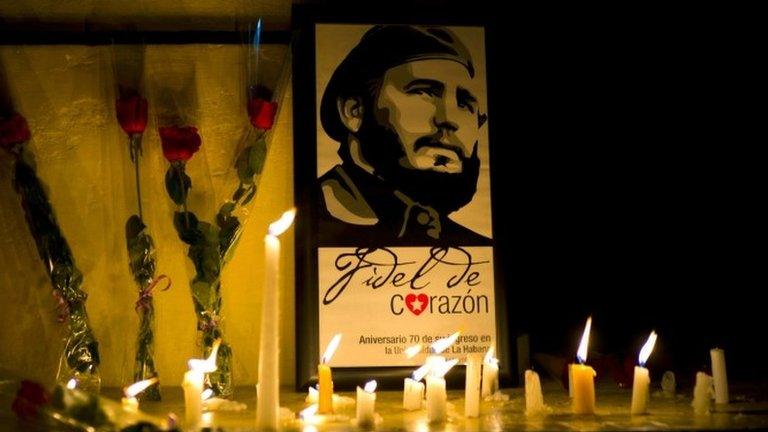
- Published26 November 2016
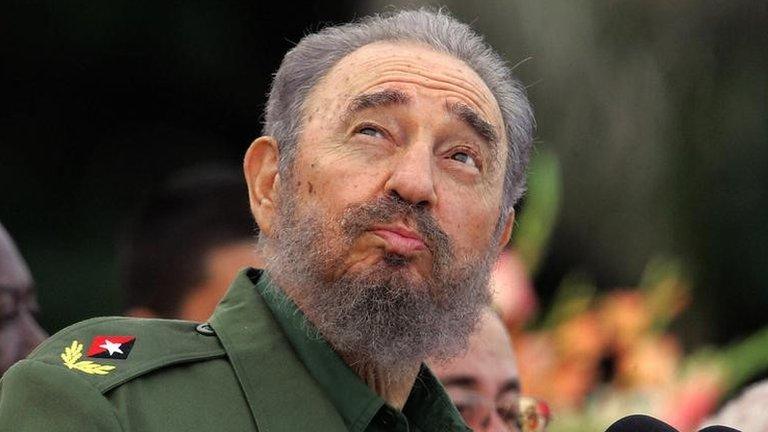
- Published27 November 2016
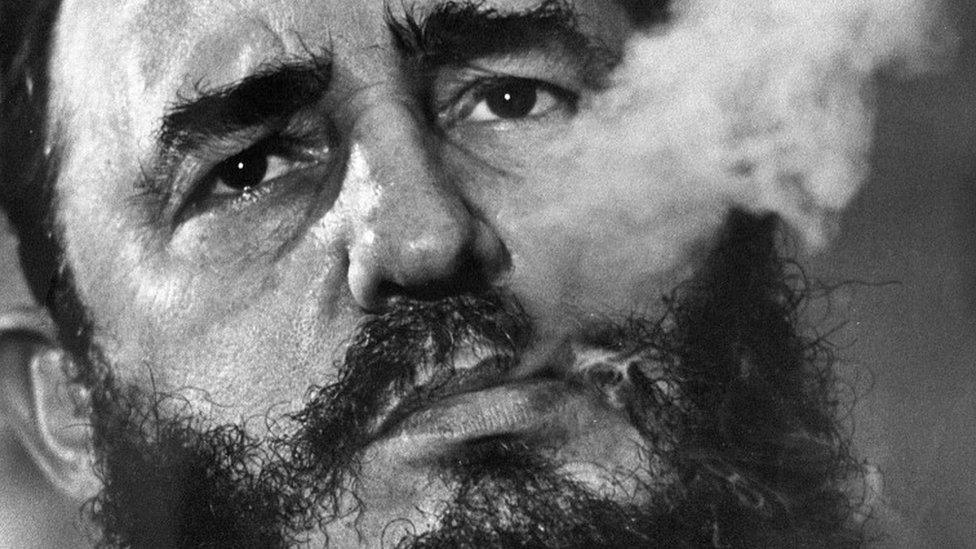
- Published26 November 2016
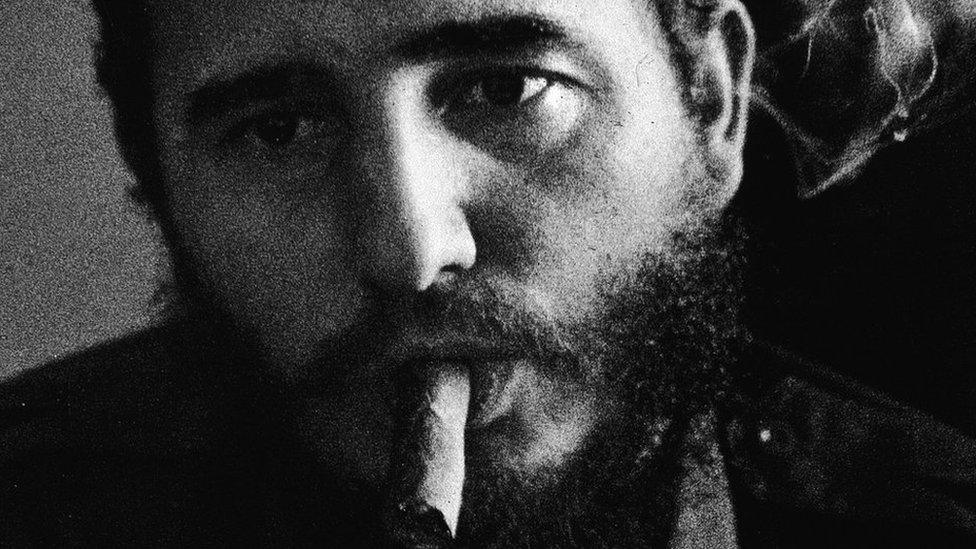
- Published14 July 2014
